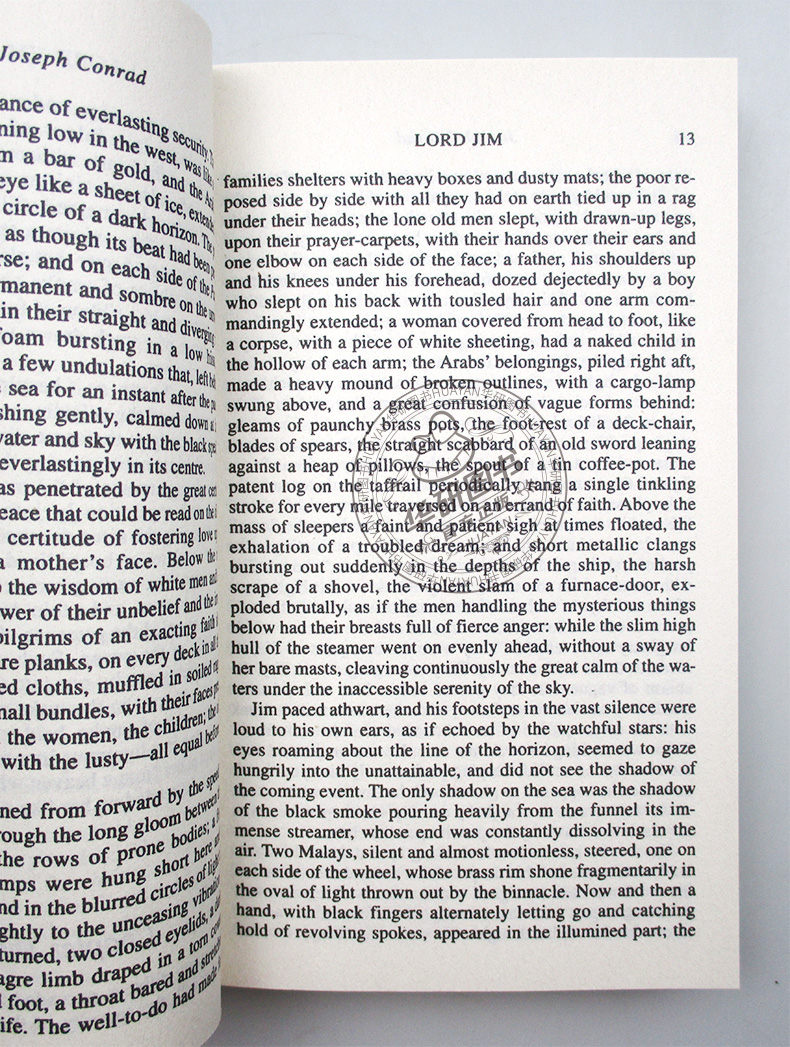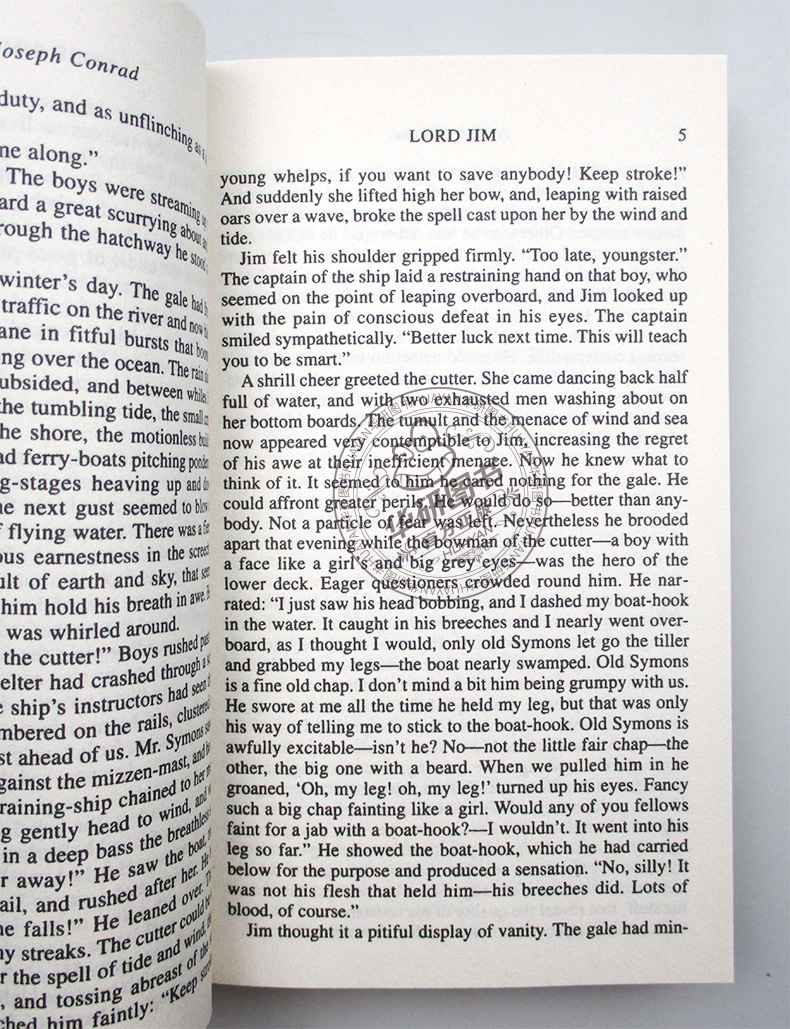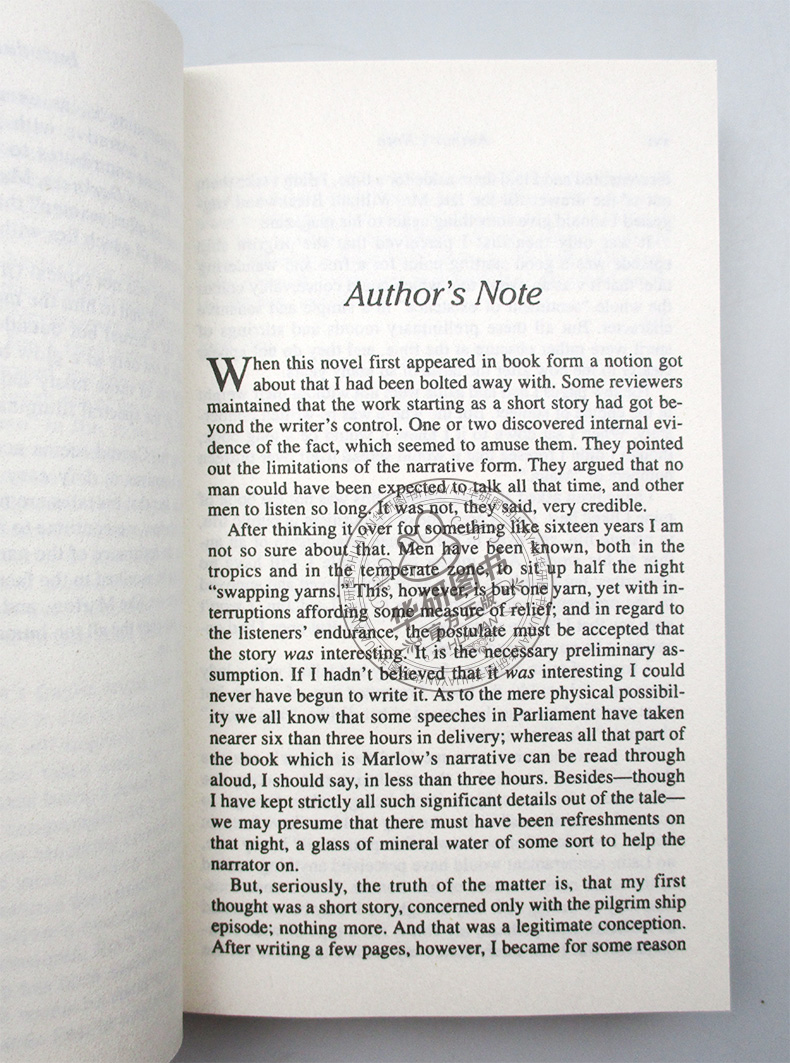商品详情





书名:Lord Jim吉姆老爷
难度:Lexile蓝思阅读指数1120L
作者:Joseph Conrad约瑟夫·康拉德
出版社名称:Signet Classics
出版时间:2009
语种:英文
ISBN:9780451531278
商品尺寸:10.6 x 2.3x 17.3 cm
包装:简装
页数:352 (以实物为准)

在英国文学史上占有重要地位的约瑟夫·康拉德对大海情有独钟,他总是以大海及海上生活作为他的小说创作的背景和题材。Lord Jim《吉姆老爷》就是其中很有影响的一部作品,被视为英国小说史上的一座丰碑,影响到后世一系列大小作家,其中美国的索尔·贝娄对他的仰慕表现得尤其突出。
本书为Signet Classics出版的英文原版,内容完整无删减,书本小巧便携。由Linda Dryden作序,Cathy Schlund-Vials后记。
“[Conrad has a] particular form of jolting the reader’s attention…practically every paragraph contains its little jolt.”—Ford Madox Ford
With this book, Joseph Conrad set the style for a whole new class of literature: the novel of civilization’s outcast finding refuge in the tropics. The natives of Patusan in the Far East worship the bold young Englishman by the name of Lord Jim, but he despises himself. Ever since he committed an impulsive act of cowardice, Jim has been tortured by his conscience, and he has outrun scandal only by moving farther and farther east. It is there, in remote Patusan, that he finds the will to cease sacrificing himself on the altar of conscience, become part of life again, and follow his star to the end,whereverit might lead…
With an Introduction by Linda Dryden and a New Afterword by Cathy Schlund-Vials

Lord Jim《吉姆老爷》的主人公吉姆因一时的怯懦在发生海难时弃船逃生,由此背负起渎职和背信弃义的耻辱,尽管事后他勇敢地承担起责任,一个人去面对法庭的审判,可自此以后他始终无法走出这种耻辱的阴影。马洛船长欣赏吉姆的为人,理解他道德的困境,后来安排他躲进与文明隔绝的土著人居住区帕图桑。吉姆以自己的勇敢和正直赢得当地土著的忠心爱戴,被尊称为“吉姆老爷”。可惜好景不长,他因一念之慈给了一伙亡命海盗一条生路,可这伙海盗离去时却背信弃义,杀死了头人的儿子、吉姆的挚友。吉姆满腔悲愤,从容赴死,以一死洗尽自己的耻辱。小说的叙述手法别具一格,分成三个部分,分别采用第三人称叙述、马洛作为旁观者的第一人称的讲述和马洛写给一位朋友的书信的展示讲完整个故事,多角度多层次的叙述技巧使一个简单的故事具有了深刻的道德和心理内涵。
A bold young English sailor has despised himself ever since an impulsive moment of cowardice. Jim moves East to Patusan, where natives worship him-and he may be able to find redemption...

约瑟夫·康拉德(1857~1924),波兰裔英国作家。1857年12月3日生于波兰波多利亚一个诗人家庭,1924年8月3日卒于英国坎特伯雷。自幼失去父母,17岁开始当水手,后升大副、船长,其航海生活达20余年。1886年入英国籍。1889年始用英语从事文学创作。1895年首部长篇小说《阿尔迈耶的愚蠢》出版。到1924年共出版31部中长篇小说及短篇小说集和散文集。他的作品根据题材可分为航海小说、丛林小说和社会政治小说。他的航海小说出色地传达了海洋上狂风暴雨的气氛,以及水手们艰苦的航海生活和深刻细微的心理活动。代表作有《水仙号上的黑家伙》《台风》《青春》《阴影线》等。他的丛林小说大部分都是由一个叫马洛的人叙述的,以《黑暗的中心》《吉姆老爷》为代表,探讨道德与人的灵魂问题,包含着深刻的社会历史内容。他的社会政治小说《诺斯特罗莫》《特务》及《在西方的眼睛下》等,表现了他对殖民主义的憎恶。他是英国现代小说的先行者之一。
JosephConrad(originally Józef Teodor Konrad Nalecz Korzeniowski) was born in the Ukraine in 1857 and grew up under Tsarist autocracy. His parents, ardent Polish patriots, died when he was a child, following their exile for anti-Russian activities, and he came under the protection of his tradition-conscious uncle, Thaddeus Bobrowski, who watched over him for the next twenty-five years. In 1874 Bobrowski conceded to his nephew’s passionate desire to go to sea, and Conrad travelled to Marseilles, where he served in French merchant vessels before joining a British ship in 1878 as an apprentice. In 1886 he obtained British nationality and his Master’s certificate in the British Merchant Service. Eight years later he left the sea to devote himself to writing, publishing his first novel,Almayer’s Folly, in 1895. The following year he married Jessie George and eventually settled in Kent, where he produced within fifteen years such modern classics asYouth,Heart of Darkness,Lord Jim,Typhoon,Nostromo,The Secret AgentandUnderWesternEyes. He continued to write until his death in 1924. Today Conrad is generally regarded as one of the greatest writers of fiction in English—his third language. He once described himself as being concerned “with the ideal value of things, events and people”; in the Preface toThe Nigger of the “Narcissus”he defined his task as “by the power of the written word... before all, to make you see”.

Chapter One
HE WAS an inch, perhaps two, under six feet, powerfully built, and he advanced straight at you with a slight stoop of the shoulders, head forward, and a fixed from-under stare which made you think of a charging bull. His voice was deep, loud, and his manner displayed a kind of dogged self-assertion which had nothing aggressive in it. It seemed a necessity, and it was directed apparently as much at himself as at anybody else. He was spotlessly neat, apparelled in immaculate white from shoes to hat, and in the various Eastern ports where he got his living as ship-chandler’s water-clerk he was very popular.
A water-clerk need not pass an examination in anything under the sun, but he must have Ability in the abstract and demonstrate it practically. His work consists in racing under sail, steam, or oars against other water-clerks for any ship about to anchor, greeting her captain cheerily, forcing upon him a card—the business card of the ship-chandler—and on his first visit on shore piloting him firmly but without ostentation to a vast, cavern-like shop which is full of things that are eaten and drunk on board ship; where you can get everything to make her seaworthy and beautiful, from a set of chain-hooks for her cable to a book of gold-leaf for the carvings of her stern; and where her commander is received like a brother by a ship-chandler he has never seen before. There is a cool parlour, easy-chairs, bottles, cigars, writing implements, a copy of harbour regulations, and a warmth of welcome that melts the salt of a three months’ passage out of a seaman’s heart. The connection thus begun is kept up, as long as the ship remains in harbour, by the daily visits of the water-clerk. To the captain he is faithful like a friend and attentive like a son, with the patience of Job, the unselfish devotion of a woman, and the jollity of a boon companion. Later on the bill is sent in. It is a beautiful and humane occupation. Therefore good water-clerks are scarce. When a water-clerk who possesses Ability in the abstract has also the advantage of having been brought up to the sea, he is worth to his employer a lot of money and some humouring. Jim had always good wages and as much humouring as would have bought the fidelity of a fiend. Nevertheless, with black ingratitude he would throw up the job suddenly and depart. To his employers the reasons he gave were obviously inadequate. They said “Confounded fool!” as soon as his back was turned. This was their criticism on his exquisite sensibility.
To the white men in the waterside business and to the captains of ships he was just Jim—nothing more. He had, of course, another name, but he was anxious that it should not be pronounced. His incognito, which had as many holes as a sieve, was not meant to hide a personality but a fact. When the fact broke through the incognito he would leave suddenly the seaport where he happened to be at the time and go to another—generally farther east. He kept to seaports because he was a seaman in exile from the sea, and had Ability in the abstract, which is good for no other work but that of a water-clerk. He retreated in good order towards the rising sun, and the fact followed him casually but inevitably. Thus in the course of years he was known successively in Bombay, in Calcutta, in Rangoon, in Penang, in Batavia—and in each of these halting-places was just Jim the water-clerk. Afterwards, when his keen perception of the Intolerable drove him away for good from seaports and white men, even into the virgin forest, the Malays of the jungle village, where he had elected to conceal his deplorable faculty, added a word to the monosyllable of his incognito. They called him Tuan Jim: as one might say—Lord Jim.
Originally he came from a parsonage. Many commanders of fine merchant-ships come from these abodes of piety and peace. Jim’s father possessed such certain knowledge of the Unknowable as made for the righteousness of people in cottages without disturbing the ease of mind of those whom an unerring Providence enables to live in mansions. The little church on a hill had the mossy greyness of a rock seen through a ragged screen of leaves. It had stood there for centuries, but the trees around probably remembered the laying of the first stone. Below, the red front of the rectory gleamed with a warm tint in the midst of grass-plots, flower-beds, and fir-trees, with an orchard at the back, a paved stable-yard to the left, and the sloping glass of greenhouses tacked along a wall of bricks. The living had belonged to the family for generations; but Jim was one of five sons, and when after a course of light holiday literature his vocation for the sea had declared itself, he was sent at once to a “training-ship for officers of the mercantile marine.”
He learned there a little trigonometry and how to cross top-gallant yards. He was generally liked. He had the third place in navigation and pulled stroke in the first cutter. Having a steady head with an excellent physique, he was very smart aloft. His station was in the fore-top, and often from there he looked down, with the contempt of a man destined to shine in the midst of dangers, at the peaceful multitude of roofs cut in two by the brown tide of the stream, while scattered on the outskirts of the surrounding plain the factory chimneys rose perpendicular against a grimy sky, each slender like a pencil, and belching out smoke like a volcano. He could see the big ships departing, the broad-beamed ferries constantly on the move, the little boats floating far below his feet, with the hazy splendour of the sea in the distance, and the hope of a stirring life in the world of adventure.
On the lower deck in the babel of two hundred voices he would forget himself, and beforehand live in his mind the sea-life of light literature. He saw himself saving people from sinking ships, cutting away masts in a hurricane, swimming through a surf with a line; or as a lonely castaway, barefooted and half naked, walking on uncovered reefs in search of shell-fish to stave off starvation. He confronted savages on tropical shores, quelled mutinies on the high seas, and in a small boat upon the ocean kept up the hearts of despairing men—always an example of devotion to duty, and as unflinching as a hero in a book.
“Something’s up. Come along.”
He leaped to his feet. The boys were streaming up the ladders. Above could be heard a great scurrying about and shouting, and when he got through the hatchway he stood still—as if confounded.
It was the dusk of a winter’s day. The gale had freshened since noon, stopping the traffic on the river and now blew with the strength of a hurricane in fitful bursts that boomed like salvoes of great guns firing over the ocean. The rain slanted in sheets that flicked and subsided, and between whiles Jim had threatening glimpses of the tumbling tide, the small craft jumbled and tossing along the shore, the motionless buildings in the driving mist, the broad ferryboats pitching ponderously at anchor, the vast landing-stages heaving up and down and smothered in sprays. The next gust seemed to blow all this away. The air was full of flying water. There was a fierce purpose in the gale, a furious earnestness in the screech of the wind, in the brutal tumult of earth and sky, that seemed directed at him, and made him hold his breath in awe. He stood still. It seemed to him he was whirled around.
He was jostled. “Man the cutter!” Boys rushed past him. A coaster running in for shelter had crashed through a schooner at anchor, and one of the ship’s instructors had seen the accident. A mob of boys clambered on the rails, clustered round the davits. “Collision. Just ahead of us. Mr. Symons saw it.” A push made him stagger against the mizzen-mast, and he caught hold of a rope. The old training-ship chained to her moorings quivered all over, bowing gently head to wind, and with her scanty rigging humming in a deep bass the breathless song of her youth at sea. “Lower away!” He saw the boat, manned, drop swiftly below the rail, and rushed after her. He heard a splash. “Let go; clear the falls!” He leaned over. The river alongside seethed in frothy streaks. The cutter could be seen in the falling darkness under the spell of tide and wind, that for a moment held her bound, and tossing abreast of the ship. A yelling voice in her reached him faintly: “Keep stroke, you young whelps, if you want to save anybody! Keep stroke!” And suddenly she lifted high her bow, and, leaping with raised oars over a wave, broke the spell cast upon her by the wind and tide.
Jim felt his shoulder gripped firmly. “Too late, youngster.” The captain of the ship laid a restraining hand on that boy, who seemed on the point of leaping overboard, and Jim looked up with the pain of conscious defeat in his eyes. The captain smiled sympathetically. “Better luck next time. This will teach you to be smart.”
A shrill cheer greeted the cutter. She came dancing back half full of water, and with two exhausted men washing about on her bottom boards. The tumult and the menace of wind and sea now appeared very contemptible to Jim, increasing the regret of his awe at their inefficient menace. Now he knew what to think of it. It seemed to him he cared nothing for the gale. He could affront greater perils. He would do so—better than anybody. Not a particle of fear was left. Nevertheless he brooded apart that evening while the bow-man of the cutter—a boy with a face like a girl’s and big grey eyes—was the hero of the lower deck. Eager questioners crowded round him. He narrated: “I just saw his head bobbing, and I dashed my boat-hook in the water. It caught in his breeches and I nearly went overboard, as I thought I would, only old Symons let go the tiller and grabbed my legs—the boat nearly swamped. Old Symons is a fine old chap. I don’t mind a bit him being grumpy with us. He swore at me all the time he held my leg, but that was only his way of telling me to stick to the boat-hook. Old Symons is awfullyexcitable—isn’t he? No—not the little fair chap—the other, the big one with a beard. When we pulled him in he groaned, ‘Oh, my leg! oh, my leg!’ and turned up his eyes. Fancy such a big chap fainting like a girl. Would any of you fellows faint for a jab with a boat-hook?—I wouldn’t. It went into his leg so far.” He showed the boat-hook, which he had carried below for the purpose and produced a sensation. “No, silly! It was not his flesh that held him—his breeches did. Lots of blood, of course.”
Jim thought it a pitiful display of vanity. The gale had ministered to a heroism as spurious as its own pretence of terror. He felt angry with the brutal tumult of earth and sky for taking him unawares and checking unfairly a generous readiness for narrow escapes. Otherwise he was rather glad he had not gone into the cutter, since a lower achievement had served the turn. He had enlarged his knowledge more than those who had done the work. When all men flinched, then—he felt sure—he alone would know how to deal with the spurious menace of wind and seas. He knew what to think of it. Seen dispassionately, it seemed contemptible. He could detect no trace of emotion in himself, and the final effect of a staggering event was that, unnoticed and apart from the noisy crowd of boys, he exulted with fresh certitude in his avidity for adventure, and in a sense of many-sided courage.
- 华研外语 (微信公众号认证)
- 本店是“华研外语”品牌商自营店,全国所有“华研外语”、“华研教育”品牌图书都是我司出版发行的,本店为华研官方源头出货,所有图书均为正规正版,拥有实惠与正版的保障!!!
- 扫描二维码,访问我们的微信店铺
- 随时随地的购物、客服咨询、查询订单和物流...












